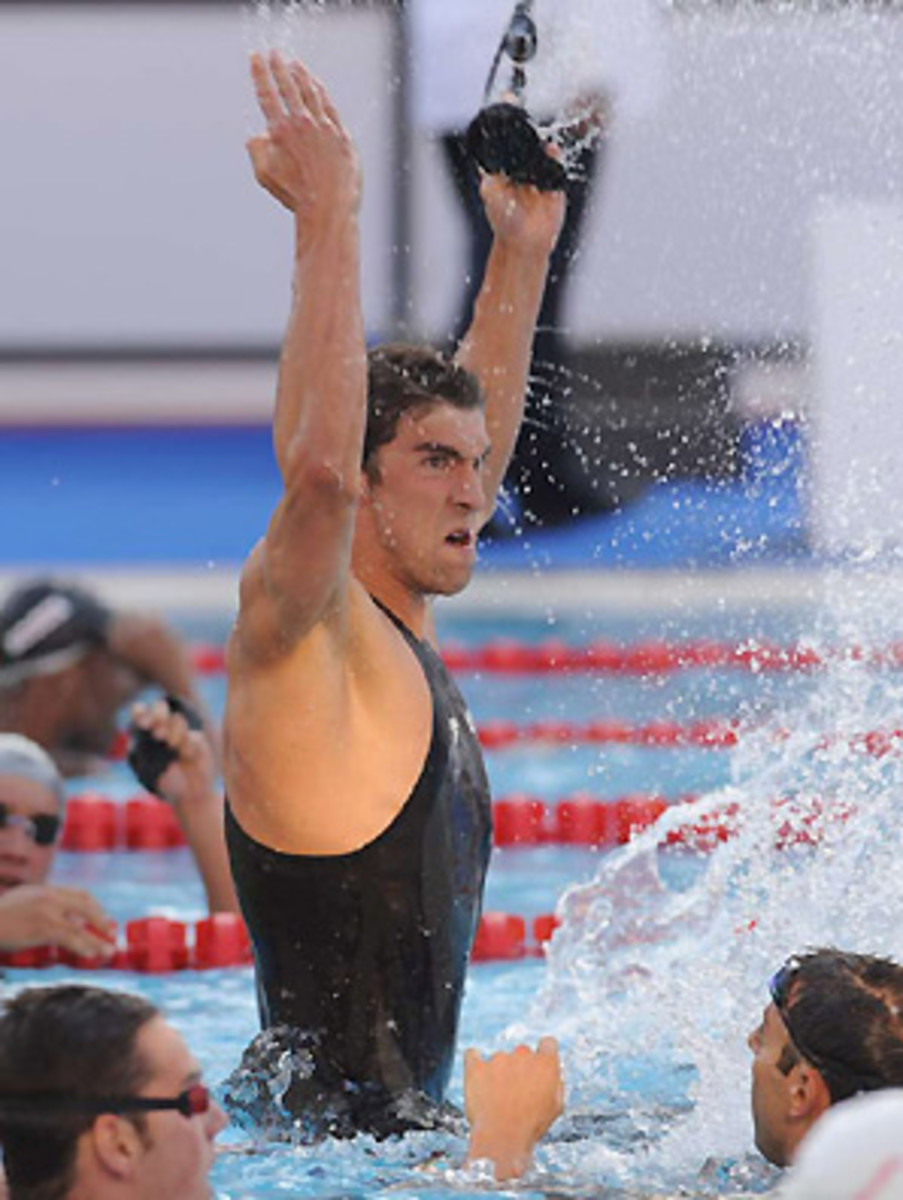
High-tech suits and Phelps reigned supreme at swimming worlds
1. It's gotta be the suits. What else could explain the absurd number of world records set in Rome? In 2008, a year when the rise of records left people calling for drug inquiries, pool measurements and the return of 1920s swimsuits, there were 102 records set throughout the year. That's almost one every three days. In Rome, swimmers set new standards 43 times in eight days. FINA, the sport's international governing body, has said it will adopt new regulations to prohibit some of the materials in the suits of the last two or three years. They will also restrict the length of some of the suits for both men and women. Still, those regulations won't go into effect until January 1 and even those will be against the objections of many suit manufacturers who want to liquidate their stock of the suits that will soon be illegal. Once that happens, some of these records could stand for some time.
2. Then again, who needs fast suits? If you're Michael Phelps, you just jump in the water and break records even without the newest polyurethane magic. Phelps was never planning to don the newest ersatz suit that will likely be banned next year. He came here in the LZR Racer suit made by his sponsor, Speedo, that includes only patches of polyurethane and now seems horribly outdated, even though it, too will likely be banned by FINA. Phelps still set a world record 1:51.51 in the 200-meter butterfly on Wednesday, outracing the field by more than a second. On Friday, he and teammate Ryan Lochte, also swimming in an outdated suit, paced the U.S. team to a world record 6:58.55 in the 4x200-meter relay. On Saturday, Phelps swam the defining moment of the meet when he beat Serbia's Milorad Cavic to the wall again, just as he had at the Beijing Olympics. Phelps touched in 49.82, with Cavic send in 49.95.
3. Home advantage matters. Water is water, right? Same two Hs and an O every time. Yes, but at every Olympics and world championship, there always seems to be a star from the home country who has a defining moment. This year, it was Federica Pellegrini, the 20-year-old native of Mirano, Italy, who became the first woman ever to break the four-minute barrier in the 400-meter freestyle. Pellegrini already owned the record, having lowered the mark to 4:00.41 at the Mediterranean Games in Pescara earlier this year, but this week she lowered the standard to 3:59.15, throwing most of the crowd in the Foro Italico into celebratory song, dance and, yes, the occasional glass of vino. The wine that was served at the outside concession stands wasn't officially permitted inside the seating area, but there was more than a whiff of Barolo going around after Pellegrini's triumph.
4. Champions can fall. On the first Sunday of swim competition, Olympic champ Park Tae-hwan of Korea was cut down badly in the 400-meter freestyle, finishing 12th among the 16 swimmers in the heats and failing to advance to the final. Later that evening, Park watched Germany's Paul Biedermann lower the world record by a hundredth of a second to 3:40.07. Biedermann wasn't done. He took down Phelps decisively in the 200 free two nights later, establishing a world record of 1:42.00, a full four seconds faster than he swam the race at the Beijing Olympics.
The most surprising victim of the new speed standards in Rome was Aaron Peirsol, the great backstroker who came to Rome with seven world titles, seven Olympic medals and a fresh world record of 51.94 seconds in the 100 back, swum in early July at the U.S. Nationals in Indianapolis. Peirsol should have been a lock to qualify for the eight-man final, but instead he paced himself as he has in the past to get through the prelims and finished ninth of 16. Ironically, Peirsol's time in that heat, 53.22, was faster than the world record 53.45 he set on a relay leg at the Athens Olympics just five years ago. On Friday, Peirsol rallied to win the 200 back in world record time (1:51.92).
5. U.S.A. diving is back. The U.S. diving team enjoyed its best showing at a world championship since 1991, winning four silver medals in Rome. Veteran Troy Dumais, 29, took second in the three-meter springboard and won a second silver in synchronized three-meter with 16-year old Kristian Ipsen. David Boudia and Thomas Finchum won silver in the synchronized 10-meter platform, and 16-year-olds Haley Ishimatsu and Mary Beth Dunnichay took second in synchronized 10 meter. The program that once produced Greg Louganis, the greatest diver in history, had fallen on hard times in recent years. The U.S. team failed to win a medal at the Beijing Olympics and won only a single bronze (Boudia and Finchum) at the 2007 world championships in Melbourne.




